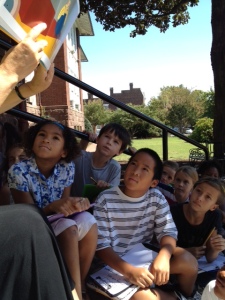 October. September is gone, proving once again that even a month lived intentionally, day-by-day and hour by hour, will fly by. September is a methodical month. At the beginning of September, I tell my third graders they don’t have to worry about doing things the wrong way, because I will teach them the right way. September is all about the right way: Eye contact. Accountable talk. Intentional chatter. Greeting one another. Moving through the space respectfully. Showing what you know when you know it and knowing when you don’t. Thinking deeply. Breathing deeply. Finding more than one right answer. Asking better questions. Widening the circle. Going the extra mile with a smile. Stepping forward to help. Keeping your desk as an invitation to learning. Taking responsibility. Taking risks.
October. September is gone, proving once again that even a month lived intentionally, day-by-day and hour by hour, will fly by. September is a methodical month. At the beginning of September, I tell my third graders they don’t have to worry about doing things the wrong way, because I will teach them the right way. September is all about the right way: Eye contact. Accountable talk. Intentional chatter. Greeting one another. Moving through the space respectfully. Showing what you know when you know it and knowing when you don’t. Thinking deeply. Breathing deeply. Finding more than one right answer. Asking better questions. Widening the circle. Going the extra mile with a smile. Stepping forward to help. Keeping your desk as an invitation to learning. Taking responsibility. Taking risks.
We learn to read and write “long and strong.” We learn that we will mistakes and we can make them right. We learn to be mindful of feelings—those of others and our own. We learn that feelings are not right or wrong… they just are. We learn that sadness fades and that joy waits to surprise us when we least expect it. We see it in literature. We see it in life.
Teachers have answers and live questions. On Friday I invited my students to live a question with me: How can we make homework better?
My third graders could not have seen the question coming, but they seemed ready for it. The opinions were strong, but varied, and the results inconclusive. There was one common thread: Less. They said less homework would be better homework. I found myself nodding my head. Their ideas were turning the right way into a better way.
Over the years I’ve worked to create homework that is meaningfully aligned with the classroom. I’ve been proud of my homework. It integrates the curriculum and is a springboard for critical thinking. I’ve tweaked it; reworked it; revamped it; revised it. My quest has been to make homework more meaningful. I think I’ve just made it more. More may be too much.
The class quickly created a survey. The children ranked the activities they liked and circled the one they hated the most.
This turned out to be a confusing process—but one thing was clear. Almost everyone likes the math game. This doesn’t surprise me. It is good practice, but I also know it is not really about the math. Most children played the game with their parents. And they love that.
I’m cutting homework back this week. The essentials are there: a math game, a reading log, vocabulary and spelling, and a little writing. This week we are living the question. Together we’ll find the answer. When it comes to homework, it may be that my third graders are teaching the teacher the right way.
Curious about the new homework? Click here: Mrs. Campbell’s Homework

Some of your phrases shape my future vocabulary –and action. Last time it was “radical act of hospitality.” This time it is “intentional chatter.”
The phrase “less is more” is one that can be applied to life in general, no matter what age you are. I am 34 and the phrase “less is more” has become a staple in my life over the last year. I have found that the less I have, the less I need. Perhaps those lessons started in the classroom many years ago. Thanks Annie. Keep teaching those little ones to think freely and creatively.
I applaud your effort, Annie, to involve your students in the conversation about homework. I look forward to an updated post, after the week is over, to see how the “less is more” philosophy worked. If the kids do well with it, then it’s my hope you can sustain that mantra throughout the school year.
These words are not just good for third graders but all of us. Thank you.
Thank you for sharing your ideas and resources. I just may changed up my homework too! 🙂